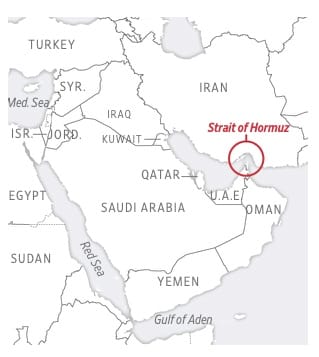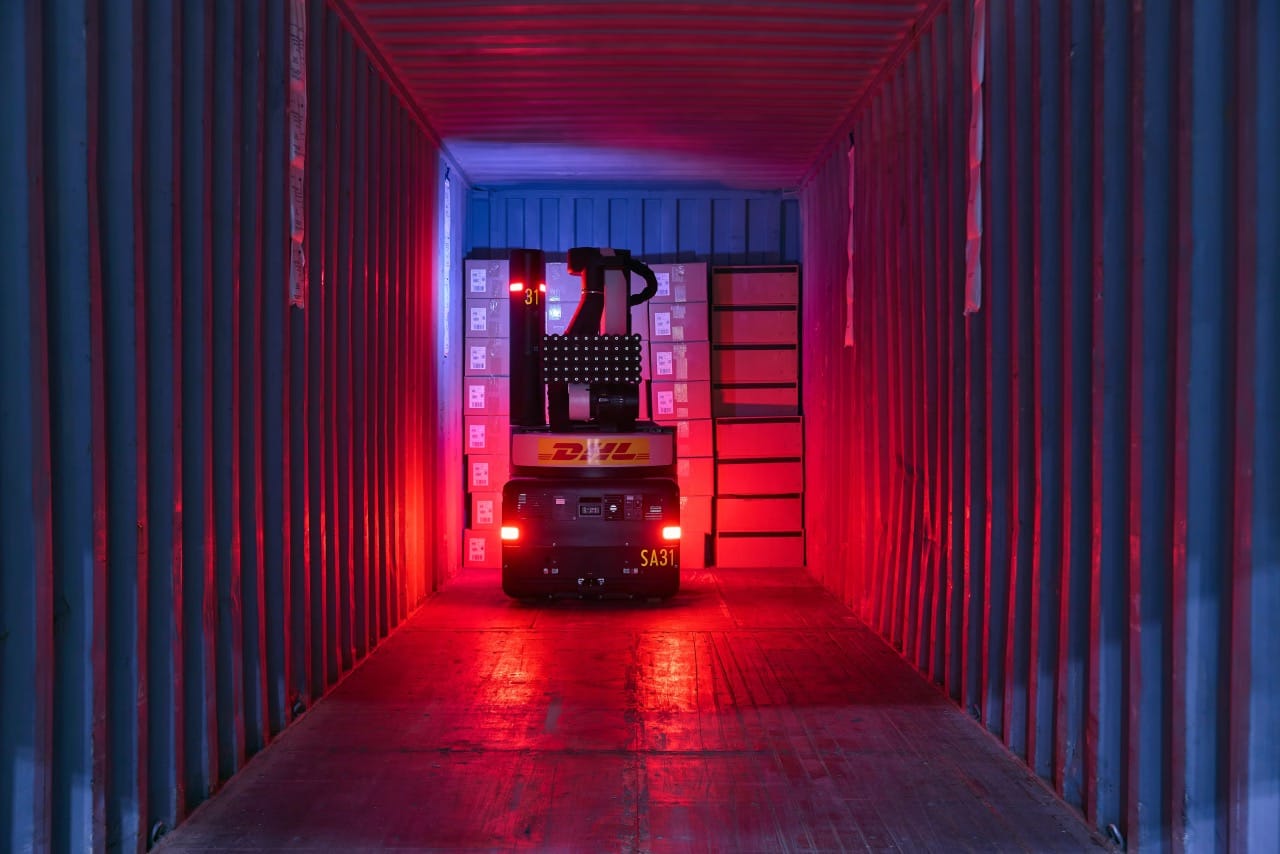June 23 2025
Mideast war fears; Iran oil threat; Senate parliamentarian; Robots unload trucks; Thunder win title;

Fears of Wider War Mount After U.S., Israel Strike Iran
Iran Conflict Threatens Global Oil Supply Through Strait of Hormuz
Senate Parliamentarian Strips Key GOP Priorities From Budget Bill
DHL, UPS Deploy New Robots to Automate Grueling Task of Unloading Trucks
Thunder Defeat Pacers in Game 7, Clinch First NBA Championship
Newsletter sponsor

1. Fears of Wider War Mount After U.S., Israel Strike Iran
Israel launched wide-ranging strikes on Tehran on Monday that it said targeted a paramilitary headquarters and a notorious prison, pressing on with its bombing campaign a day after U.S. strikes on a trio of Iranian nuclear sites. The new barrage, which Israel’s military spokesman said was focused on “command centers” of the powerful Revolutionary Guards, came as Iran fired salvos of missiles that sent Israelis to huddle in shelters. As damage from the latest strikes was still becoming clear, world leaders called on both sides to ease their attacks, even as President Trump’s decision to join Israel’s campaign against Iranian nuclear sites raised fears that the war would escalate. American military and intelligence officials detected potential signs that Iran-backed militias were preparing to attack American bases in Iraq, and possibly Syria. Iranian officials appeared to be weighing their options for retaliation against the United States. Iran’s foreign minister, Abbas Araghchi, met with President Vladimir V. Putin of Russia on Monday as the Kremlin seemingly sought to push back against the suggestion that it was offering little support to Iran. Even though Russia is a longtime ally of Iran, there has been little sign so far that Moscow is prepared to provide military assistance to Tehran in this war. More than 24 hours after U.S. bombers hit three uranium-enrichment sites in Iran, prompting Mr. Trump to declare that Iran’s nuclear program had been “totally obliterated,” the actual state of the program seemed far more murky, with senior officials conceding they did not know the fate of Iran’s stockpile of near-bomb-grade uranium. Trump administration officials emphasized on Sunday that the United States did not want an all-out war with Tehran, but Mr. Trump’s position was less clear — particularly when he raised the prospect of regime change in Iran in a social media post on Sunday. He was set to meet with his National Security Council on Monday.
NYT
Dashcam video captured a huge explosion next to a road in Ashdod in Israel, as Iran launched a new wave of strikes following Israeli and US attacks on its nuclear sites. pic.twitter.com/Bf9lgABL3E
— Al Jazeera English (@AJEnglish) June 23, 2025
LOVING: HOW THE US SHOULD DEAL WITH IRAN
In a region with no satisfying solutions, America should back Saudi Arabia and contain Iran

2. Iran Conflict Threatens Global Oil Supply Through Strait of Hormuz
Roughly 20% of the world’s petroleum passes through the 20-mile-wide strait, where dozens of skyscraper-size tankers each day funnel into a pair of 2-mile-wide traffic lanes separated by a 2-mile-wide buffer. The transit through that 6-mile strip within the strait includes a similarly huge share of the world’s liquefied natural gas. Crucial for cars, chemical makers and power plants around the world, the supplies help fuel the oil-hungry Chinese economy and dictate prices paid by U.S. drivers and air travelers. Iran has often harassed foreign-flagged tankers in the area and occasionally threatened to disrupt that trade more broadly in times of stress, a move that could upend financial markets and send global energy costs soaring. Even so, oil markets are wary. Brent crude futures, the international pricing benchmark, jumped more than 3% on Sunday. Oil prices then eased early Monday, falling about 0.5% to trade at almost $77 a barrel. Brent was trading below $70 before Israel unleashed its punishing air campaign earlier this month. U.S. stock futures edged higher Monday, with contracts tied to the S&P 500 up about 0.2%. For Tehran, the Strait of Hormuz is “a bargaining chip,” said Anthony Gurnee, a retired longtime tanker-company executive. “Once they use it, it’s gone.”
WSJ

3. Senate Parliamentarian Strips Key GOP Priorities From Budget Bill
Senate parliamentarian Elizabeth MacDonough, who has been hearing arguments from Republicans and Democrats behind closed doors, issued guidance in recent days on which measures don’t fit within the so-called budget-reconciliation process. She is expected to issue more guidance through Sunday night into Monday. Under budget reconciliation, provisions have to be primarily related to the budget to be eligible for a simple majority vote, rather than the 60 votes typically required in the Senate. One of the top measures that the parliamentarian said didn’t fit, according to Democrats who publicized her decisions: a provision requiring states to pay a portion of food benefits, with their share increasing the more they mistakenly overpay or underpay beneficiaries. It isn’t clear if Republicans plan to rework the measure to try to accommodate the parliamentarian’s guidance. The measure as originally passed in the House would have saved $128 billion over a decade, according to the Congressional Budget Office. While the Senate scaled back the House cuts, it didn’t entirely eliminate them. The parliamentarian said a provision barring people living in the country illegally from receiving nutrition assistance didn’t conform to the requirements of the budget-reconciliation process. She also struck out a measure that would have required plaintiffs to post potentially enormous bonds when asking courts to issue preliminary injunctions or imposing temporary restraining orders against the federal government. She said a provision that would reduce the Consumer Financial Protection Bureau’s funding to zero didn’t qualify for reconciliation. She also said a proposal to merge the Public Company Accounting Oversight Board, the U.S. audit watchdog, into the Securities and Exchange Commission wasn’t eligible for the fast-track process.
WSJ
4. DHL, UPS Deploy New Robots to Automate Grueling Task of Unloading Trucks
Loading and unloading a truck is backbreaking, mind-numbing work that retailers and parcel carriers have tried to solve for years. Workers may not stay long in these jobs. Summers and winters are particularly grueling for anyone stuck in a metal trailer, slinging heavy boxes. Injuries are common. Automating this process has long been the holy grail of warehouse logistics. When loaded, packages must be fitted together to fill the available space and be sorted by weight—with the heaviest items on the bottom—so they don’t topple or break. Unloading them is challenging, too, because the unloader must move in and out of a trailer, ferrying packages of different sizes and weights. On a typical warehouse floor today, every task might be heavily automated—except for workers loading and unloading the trucks. People who have worked these jobs say they have to stand for extended periods, hefting boxes as heavy as 70 pounds. Boston Dynamics, has designed a robot called Stretch, named for its flexible arm that can reach the top corners of a trailer. With a vacuum gripper covered in suction cups, it can lift boxes weighing up to 50 pounds. DHL now has a total of seven Stretch robots in supply-chain facilities in three states and has trained nearly 100 associates to operate them. In Columbus, Ohio, one Stretch robot that DHL staff named “Johnny 5” unloads around 580 cases an hour, almost twice the rate of a human unloader. SHARE YOUR THOUGHTS What impact could this breakthrough have on the shipping and logistics industries? Join the conversation below. DHL in May signed an agreement with Boston Dynamics for 1,000 more robots. United Parcel Service is also increasing automation at its facilities, including for loading and unloading trailers—a move that will help the company cut costs, UPS executives said in April. FedEx has been testing and refining the truck-loading process in one of its facilities with robotics company Dexterity since 2023. Walmart also has introduced robots that can unload a truck.
WSJ

5. Thunder Defeat Pacers in Game 7, Clinch First NBA Championship
OKLAHOMA CITY — For the first time, the urgent, deafening, nonstop “OKC!” chants rained down on the NBA’s champions. The Oklahoma City Thunder defeated the Indiana Pacers, 103-91, in Game 7 of the NBA Finals on Sunday night at Paycom Center, clinching its first NBA championship since it relocated from Seattle in 2008. Guard Shai Gilgeous-Alexander finished with a game-high 29 points to go with 12 assists and became the first player to be named regular season MVP and Finals MVP in the same season since LeBron James in 2013.
The Washington Post
June 23, 1868: Christopher Latham Sholes patents the QWERTY typewriter, revolutionizing communication. His first version was cobbled together using an old table, a circular piece of glass, a telegraph key and piano wire.
Sign up for local news delivered to your inbox in:
Many more cities coming soon!
See the citizen journal Podcast! Released on Apple and Spotify around 10a CST.
Sponsors (click me!)





SUBSCRIBE TO GET THE CITIZEN JOURNAL IN YOUR INBOX - FREE!
subscribe/unsubscribe to city emails, subscribe to app notifications, get the app
Sources
- https://www.nytimes.com/live/2025/06/23/world/iran-trump-israel-news/here-are-the-latest-developments?smid=url-share
- https://www.wsj.com/world/middle-east/strait-hormuz-oil-markets-0d046c6b?mod=WSJ_home_mediumtopper_pos_4
- https://www.wsj.com/politics/policy/trumps-big-beautiful-bill-gets-slimmed-down-in-senate-95cf57e6?mod=hp_lead_pos4
- https://www.wsj.com/business/logistics/the-holy-grail-of-automation-now-a-robot-can-unload-a-truck-ad527ba8?mod=hp_lead_pos9
- https://www.washingtonpost.com/sports/2025/06/22/nba-finals-game-7-thunder-pacers/
Contact: greg@loql.ai


